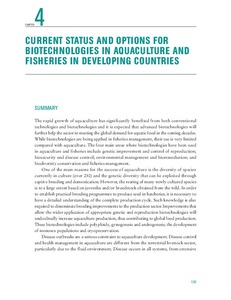Current Status and Options for Biotechnologies in Aquaculture and Fisheries in Developing Countries.

View/
Average rating
votes
Date
2011Corporate Author
Food and Agriculture Organization of the United Nations (FAO)
Status
Published
Metadata
Show full item recordAbstract
The rapid growth of aquaculture has significantly benefited from both conventional
technologies and biotechnologies and it is expected that advanced biotechnologies will
further help the sector in meeting the global demand for aquatic food in the coming decades.
While biotechnologies are being applied in fisheries management, their use is very limited
compared with aquaculture. The four main areas where biotechnologies have been used
in aquaculture and fisheries include genetic improvement and control of reproduction;
biosecurity and disease control; environmental management and bioremediation; and
biodiversity conservation and fisheries management.
One of the main reasons for the success of aquaculture is the diversity of species
currently in culture (over 230) and the genetic diversity that can be exploited through
captive breeding and domestication. However, the rearing of many newly cultured species
is to a large extent based on juveniles and/or broodstock obtained from .....
Resource URL
http://www.fao.org/3/i2300e/i2300e.pdfTitle of Report
Biotechnologies for Agricultural Development: Proceedings of the FAO International Technical Conference on “Agricultural Biotechnologies in Developing Countries: Options and Opportunities in Crops, Forestry, Livestock, Fisheries and Agro-industry to Face the Challenges of Food Insecurity and Climate Change” (ABDC-10).Page Range
pp.191-239Publisher
Food and Agriculture Organization of the United Nations (FAO)Rome, Italy
Document Language
enSustainable Development Goals (SDG)
214.7
Best Practice Type
Manual (incl. handbook, guide, cookbook etc)Citation
Food and Agriculture Organization of the United Nations (FAO( (2011) Current Status and Options for Biotechnologies in Aquaculture and Fisheries in Developing Countries. In: Biotechnologies for Agricultural Development : Proceedings of the FAO International Technical Conference on “Agricultural Biotechnologies in Developing Countries: Options and Opportunities in Crops, Forestry, Livestock, Fisheries and Agro-industry to Face the Challenges of Food Insecurity and Climate Change” (ABDC-10), Rome, Italy, Food and Agriculture Organization of the United Nations (FAO). pp.191-239. DOI: http://dx.doi.org/10.25607/OBP-1065Collections
 Repository of community practices in Ocean Research, Applications and Data/Information Management
Repository of community practices in Ocean Research, Applications and Data/Information Management